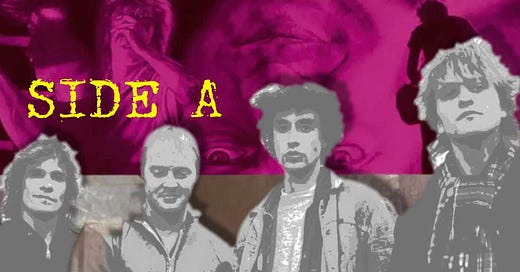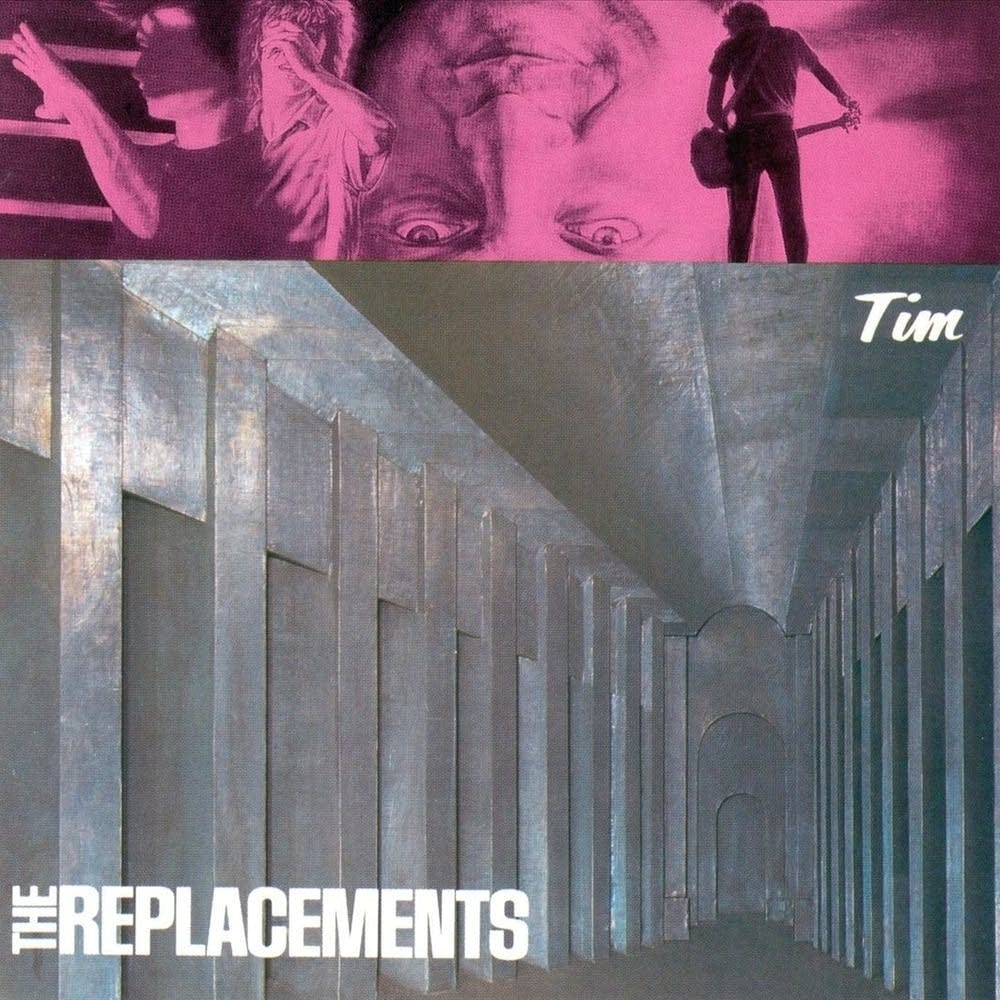In June 1985, ramshackle Minneapolis quartet The Replacements entered the studio to record their break out album, Tim. To celebrate the upcoming 40th anniversary of this landmark release, we’re going all out with Tim love letters this week.
This is the first of two posts featuring 11 Substack music writers exploring Tim Song-X-Song. Today is Side A, tomorrow is Side B.
Tim.
It’s safe to say that The Replacements fourth album changed the lives of the many mid-‘80s teens and twenty-somethings who remain fiercely devoted 40 years later. Its broader reputation has grown too, making endless “Best Album” lists, influencing musicians worldwide, and earning new generations of fans (I just got a compliment on my Tim T-shirt from my daughter’s college-aged friend an hour ago).
Their major label debut for Sire/Warner Bros., Tim was the album that first gained the scrappy Minneapolis quartet—fronted by revered singer/songwriter Paul Westerberg—mainstream awareness. The collection retained just enough of the loud and loose charm of Twin/Tone releases such as Let It Be (1984), while delivering on the pop leanings that further coalesced on Pleased To Meet Me (1987)
Not only was their sound evolving, but this would also be founding guitarist Bob Stinson’s final album with Westerberg, his little brother/bassist Tommy Stinson, and drummer Chris Mars. Tim was simultaneously a swan song for that belligerent, beloved line up of the band and a launching pad for their more commercial ambitions.
Tim was The Replacements most focused and mature album to date, despite taking many stylistic risks—but unpredictability was always part of the appeal, both in the studio and on stage.
The 1981 debut, Sorry Ma, Forgot To Take Out The Trash (1981), was a reckless and rambunctious introduction to their unique brand of Midwestern punk that had more influences up its heart-covered sleeve than was obvious at first glance. That was followed by the hardcore EP Stink (1982), an often overlooked but important part of their evolution, and the charmingly erratic second full-length, Hootenanny (1983).
By the time they released the final two albums, Don’t Tell A Soul (1989) and All Shook Down (1990), it wasn’t always easy to trace the transformation of their sound from the early ‘80s to their break up in 1991—unless you start with Tim. Using that legendary collection as the Rosetta Stone, it’s possible to make sense of their erratic path from self-destructive, self-effacing punks to self-sabotaging would-be pop stars.
With songwriting and performances so good that it could withstand endless complaints about the album cover and its instantly dated production style (a longtime fan and detractor gripe definitively addressed by 2023’s Tim: Let It Bleed Edition), the original 1985 album remains a crown jewel in The Replacements impressive catalog.
Tim is a masterpiece. I asked a few talented Substack music writers to help me explain why, starting with Side A.
TIM—SIDE A
Hold My Life
By
Anyone concerned that The Replacements would lose their ragtag vibe upon signing to a major label had nothing to worry about. Tim’s first track, the freewheeling rocker “Hold My Life,” begins with a burst of guitar chords that crash like breaking glass and a scruffy-voiced Paul Westerberg sounding apprehensive as he warbles about a thorny catch-22: “Time for decisions to be made/Crack up in the sun/Lose it in the shade.” In fact, anxiety is the driving force behind “Hold My Life,” as Westerberg’s lyrics admit a fear of success and express uncertainty about the best next steps to take, before ultimately deciding to prolong any of these big decisions: “Time for this one to come alive/And hold my life/Until I'm ready to use it.”
Musically, the song aches with melancholy, as Westerberg sounds particularly vulnerable and frayed at the edges as he sings the lines “because I just might lose it” with increasing urgency. The “Hold My Life” protagonist is looking for a savior—or at least some solace—and by the song’s end seemingly finds that soft landing.
I'll Buy
By
Cruisin' in the sunshine, ain't yet been to bed I could hear the motor whistlin', something's off the wall again
The mania has been creeping in all night. Now the sun is up and I can feel that bastard truly raging. There is a high pitched squeal in my right ear. I’ve got eleven dollars left in my hip pocket. My Visa card was just declined at the pump. She fell asleep twenty minutes ago with smeared lipstick on her cheek. While dozing off, she kept mumbling, “I don’t know where my watch is." She doesn’t remember the pawn shop.
I pull back into the parking lot of her dirty, beige apartment block and try to peel her off the seat. As I take her hand in the Minneapolis morning, she stands timidly and squints in the bright sunshine. She holds a hand over her face to block the light. Before turning away to her room, she leans over, pecks my cheek and says, “If you’re ever looking for a good time again, you know where to find me.”
Kiss Me on the Bus
By Elizabeth Nelson (
)I can't think of a more nauseating place to fall in love than a city bus. But sometimes those are the situations you find yourself in. Not everybody gets invited to the Met Gala. Not everybody can even afford to ride the subway. So, there we are, across from each other, on our way to work. He looked queasy. I definitely felt queasy. We got sequestered beside one another by the strange and militant rules of bus culture, as sacrosanct as the various-strains of Catholic liturgy, one person gets called to the front, one person doesn’t. To meet on the bus is transporting. The working folks’ rom-com, supposing they ever had time for that. Maybe the most beautiful marriage vow from any modern contemporary song: “Your tongue. Your transfer, your hand, your answer.”
Dose of Thunder
By Tony Pierce (
)For alkies, the Mats sure wrote a kickass song about blow in "Dose of Thunder," the sole tune the group has joint writing credits for on Tim. Batting cleanup on the first side of the album, adding punch between the two mellow masterpieces ("Kiss Me on the Bus" and "Waitress in the Sky"), "Dose of Thunder" re-releases the kraken which are the dual Stinson attack of Bob's howling wails and Tommy's ominous bass.
The song was so powerful the group only performed it 33 times live despite coming in at a tight two minutes and nineteen seconds. The boys played 63 songs live more than this uppercut. It was only in their set for 11 months and then tossed out like a spent bindle in a pool hall john.
Waitress in the Sky
By
Bag smasher...bus driver...trolley dolly...
All names aviation workers have been called over the years. The public seems to delight in flinging these sorts of epithets at industry workers.
Flight attendants are there for your safety—that part of the safety demo isn't just for funsies—but it's easier to dismiss them as vending machines with arms (as one CEO was once overheard saying on a hot mic). Perhaps doubly so, as this historically had been a primarily female job. Stereotypes don't wash away easily.
A lot of people work hard to make your flight as safe—and uneventful as possible. The goal is to get you from point A to point B on time safely, not become fodder for your next dinner party conversation.
So, it's more than a little weird to love a song about something I can't stand. When Paul Westerberg wrote the lyrics, it was from first-hand experience...just not his own. His sister Julie was a (real union) flight attendant at the same airline where I work. She shared some tales from the office, and he, in turn, spun them into a deliriously catchy sing-along.
Everyone should work in retail or the service sector for a year. The world would be a better place for it. And everyone should hear "Waitress in the Sky" at least once.
Swingin Party
By
Imagine you’re Lorde. You’re not even 18-years-old, and your debut song “Royals” is beginning to blow up bigger than you could have ever imagined. You decide your next single will be “Tennis Court,” but you need a B-side. You don’t have many songs, so your team suggests you release a cover.
Though your music is a bit off-kilter, you’re a burgeoning pop star. Maybe you mine the catalogs of yesteryear’s pop stars for a song. Madonna’s moody “Live to Tell” might make the perfect B-side to “Tennis Court,” your sophmore single. But you decide to turn to another ‘80s artist: The Replacements.
While I can’t claim that every detail of this anecdote is true, it is true that Lorde did release a cover of The Replacements’ “Swingin Party” as the B-side of her second single. And I think that song choice highlights a core tension of The Replacements’ music.
When most people think of The Replacements, they think of a fuzzy, scuzzy punk band that drank enough alcohol for a small, midwestern city. While “Swingin Party” is much more sleek than their earlier work, you still get elements of that debauchery. “Bring your own lampshade, somewhere there's a party,” Paul Westerberg sings at the opening of the song. “Here it's never ending, can't remember when it started.”
But the topic doesn’t negate the fact that “Swingin Party” is one of the tightest written pop songs you will ever hear. Its melody rivals McCartney at his best. Its lyrics do much the same for Dylan (e.g., “If being alone’s a crime, I'm serving forever / Being strong’s your kind, I need help here with this feather”). If I were a pop star on the cusp, The Replacements are where I would turn too.







